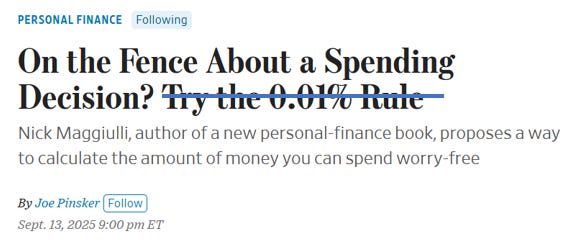Last weekend, a new personal finance decision rule received a Wall Street Journal headline.
As if the word “rule” makes the idea credible.
Here it goes:
If you're wondering whether you can afford a fun purchase, put it to a quick test.
If the cost of fun > 0.01% of your wealth, “DON’T DO IT!”
1,000 Bad Things About This Idea
Here are 5:
Money advice about how to spend is presumptuous. What does a money writer know about how any household wants to spend in light of their age, longevity, location, and tax bracket?
What economic theory produced 0.01%? Answer: none. Rule attributable to Jay-Z. I’m not kidding.
How is wealth measured? Unclear because I didn’t buy Nick Maggiulli’s book.
Home equity drives most wealth in the U.S., and people typically define wealth as the difference between what they own and what they owe.
Typically, at any point in time,
Wealth = value of financial accounts + value of retirement plans + home value - mortgage - credit card debt
But, even in this view of wealth, there is a big miss: people are their own economic engine. We call that human capital. Human capital is today’s estimate of your future income potential. Likely not included in the 0.01% calculation, but human capital should inform spending in economics-based thinking.
Over time, people will begin to believe the rule. One money writer sells the idea. Then, fifty money creators blog it. Then the rule becomes viral. Even worse, financial planners begin to mention it.
There is no proof an individual who adopts this rule will be living at a sustainably higher living standard.
The Best Idea
Live at your highest sustainable living standard. What does that mean?
You or your household has an annual spending cap. Your number is different from mine because our human capital and money circumstances are different.
The approach to discovering your sustainable spending cap is the same for everybody. Nobel Prize winners were involved.
I wish I could sell you the software you need, but
built a firm to do that. It is very cool.Finding your highest sustainable living standard requires you to gather a wee bit of information. I can help with that. My students have been doing these analyses for their family and friends for years. I have the process down.




Thank you for this post... I haven't heard about that rule. But I wonder how someone can write such a rule as if this would mirror reality? I think he has never worked with real people. It's only marketing to sell a book. Unfortunately people will start listening and following and become more stressed because they think they can't afford fun. I think we have to get more noisy about real approaches like yours 😊
“Live at your highest sustainable living standard.”
This is truly all I needed to know. Thank you.